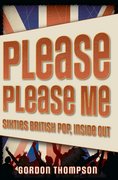By Gordon R. Thompson
After the success of the single “Please Please Me” and the release of the album Please Please Me, British fans and the press eagerly anticipated “From Me to You.” Fans had pre-ordered so many copies of the disk that when Parlophone did release R 5015 on 11 April 1963, the single immediately appeared in pop charts where it would stay for an amazing 21 weeks. In the sometimes-volatile New Musical Express charts, “From Me to You” charged into the ratings almost immediately, displacing Gerry and the Pacemakers and their version of “How Do You Do It” from the top position in the 26 April issue. But British journalists found challenges in describing the music and the artists.
 The music press knew this disc would be a success, as indeed would every Beatles release until 1967. This success presented many critics with a significant problem: what of any consequence could they say about a Beatles record? Fans were going to buy the records no matter what they said. More problematically, the Beatles represented music that British music critics had difficulty understanding. The industry had disdained rock and roll in favor of smoother artists, for example transforming Cliff Richard from a snarling, Elvis-imitating rocker singing “Move It” into the harmless film star of Summer Holiday (January 1963). But the Beatles represented something different and writers seemed to lack a vocabulary for what they heard on these recordings and in concert halls, let alone what was transpiring in the minds of teens listening to these discs at home.
The music press knew this disc would be a success, as indeed would every Beatles release until 1967. This success presented many critics with a significant problem: what of any consequence could they say about a Beatles record? Fans were going to buy the records no matter what they said. More problematically, the Beatles represented music that British music critics had difficulty understanding. The industry had disdained rock and roll in favor of smoother artists, for example transforming Cliff Richard from a snarling, Elvis-imitating rocker singing “Move It” into the harmless film star of Summer Holiday (January 1963). But the Beatles represented something different and writers seemed to lack a vocabulary for what they heard on these recordings and in concert halls, let alone what was transpiring in the minds of teens listening to these discs at home.
Record Retailer and Music Industry News, in a prophetic bit of hyperbole, noted (11 April) that “Beatle hysteria has never been higher—and this is a likely Number One.” Keith Fordyce, in The New Musical Express (12 April), commented that the disc possessed “plenty of sparkle” and a “commercial” lyric, and would entering the charts “quickly.” Nevertheless, despite approving the singing, the harmonizing, and the lyric, he did not “rate the tune as being anything like as good as on the last two discs” [“Love Me Do” and “Please Please Me”]. And Don Nicholl in Disk (13 April) applauded “From Me to You” as a “lusty beater” destined to be a hit, and notes that the harmonica, guitar, and singing would send the recording to the top of the charts. Notably, Nicholl remarked on the “surprising falsetto phrases” in the song, presumably referring to the insertion of the syllable “whoo” at the end of the chorus that the Beatles had copied from the Isley Brothers. Every time they sang the syllable in their performances of “Twist and Shout” and shook their heads, their audiences screamed. John Lennon and Paul McCartney knew a good thing when they heard it and copy it they did. Critics knew that what they heard was a hit, but were unsure what it meant.
Record Retailer was right about the hysteria and by now the band was touring constantly while continuing their juggernaut of near daily appearances on radio and television shows, including a third appearance on Thank Your Lucky Stars to promote the record. Having taped this show on Easter Sunday (14 April) in Teddington and finding themselves on the south side of the Thames, they took the opportunity to hear a band that impresario Georgio Gomelsky had recommended to Brian Epstein. When they entered the “Crawdaddy Club” (a room rented by Gomelsky) they encountered a band that he unofficially managed: the Rolling Stones. The Stones certainly knew who the Beatles were and the Beatles were impressed with what they heard, inviting the London band to be their guests when they appeared at the Royal Albert Hall later the same week. After that show, as some of the Stones helped Mal Evans load the Beatles van, a group of shrieking girls surrounded them, thinking they were the soon-to-be Fab Four. Although the girls were disappointed, Brian Jones of the Stones knew immediately what he wanted.
On Sunday 21 April, the New Musical Express held their annual “Poll-Winners All-Star Concert” which featured the performers who had gathered the most points in categories such as “Best Male Vocalist” and “Best Instrumental Group.” Recognizing (or perhaps fearing) a sea change in British pop music, the NME added four acts that had not been on the ballot to a program that featured perennial winners Cliff Richard and the Shadows. The Beatles, Gerry and the Pacemakers, Mark Wynter, and Mike Berry joined the roster of acts; but everyone knew who stole the show. A sea change was growing into a tidal wave.
Gordon R. Thompson is Professor of Music at Skidmore College. His book, Please Please Me: Sixties British Pop, Inside Out, offers an insider’s view of the British pop-music recording industry. Check out Gordon Thompson’s posts on The Beatles and other music here.
Subscribe to the OUPblog via email or RSS.
Subscribe to only music articles on the OUPblog via email or RSS.
Image courtesy of Gordon Thompson.


Recent Comments
There are currently no comments.